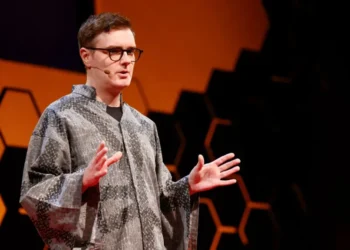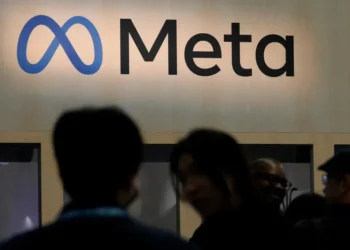Nvidia CEO Jensen Huang Unveils Rubin AI Chips at GTC 2025
Nvidia founder and CEO Jensen Huang took the stage at GTC 2025—hailed as the “Super Bowl of AI”—to unveil the company’s latest advancements in artificial intelligence. Addressing a packed audience, Huang emphasized that AI is at a critical “inflection point” as it moves toward a future shaped by robotics and autonomous systems.
The Future of AI: Blackwell Ultra and Rubin AI Chips
One of the most highly anticipated moments of the keynote was Huang’s announcement of Nvidia’s next-generation graphics architectures. He introduced Blackwell Ultra, slated for release in the second half of 2025, followed by its successor, Rubin AI, launching in late 2026. A more advanced version, Rubin Ultra, is expected in 2027. The Rubin AI chips, named after renowned astronomer Vera Rubin, are designed to push the boundaries of AI-driven computing.
Huang predicted that demand for GPUs from major cloud service providers will continue to surge, with Nvidia’s data center infrastructure revenue projected to reach $1 trillion by 2028.
AI’s Evolution: From Generative Models to Agentic AI
During his two-hour keynote, Huang outlined the rapid progress of AI, explaining how it has evolved from computer vision to generative AI and now to agentic AI—AI that can reason, understand context, and generate solutions dynamically.
“AI understands the context, understands what we’re asking. It now generates answers. This has fundamentally changed how computing is done.” – Jensen Huang
According to Huang, the next wave of AI is robotics—a field he calls “physical AI.” This next step in AI development will enable machines to understand real-world physics, including friction, inertia, cause and effect, and object permanence.
Training AI with Synthetic Data
A key theme in Huang’s address was the growing importance of synthetic data—computer-generated training data that allows AI to learn at speeds far beyond human capability.
“There’s only so much data and so many human demonstrations we can perform. Reinforcement learning is the big breakthrough of the last few years.” – Jensen Huang
To facilitate this, Nvidia introduced Isaac GR00T N1, an open-source AI model designed to train humanoid robots. The model will work in tandem with Cosmos AI, which generates high-quality synthetic data for AI training.
Revolutionizing Robotics and Autonomous Systems
Huang’s announcements underscored Nvidia’s focus on enhancing robotics training through simulated environments. Training robots in the real world is costly and time-consuming, making simulation-based reinforcement learning a crucial tool for researchers and engineers.
Industry Reactions
Benjamin Lee, a professor of electrical and systems engineering at the University of Pennsylvania, praised Nvidia’s open-source approach:
“Providing an open-source platform will allow more researchers—beyond just the big players in the industry—to experiment with synthetic data and reinforcement learning.”
Nvidia’s Expanding Role in Autonomous Vehicles
Nvidia’s innovations are already making an impact in the automotive industry. Huang announced a partnership with General Motors, which plans to integrate Nvidia technology into its new fleet of self-driving cars. The companies will collaborate on building custom AI systems using Omniverse and Cosmos AI models to enhance AI-powered manufacturing and navigation.
Additionally, Nvidia introduced Halos, an AI-driven safety system specifically designed for autonomous vehicles. Huang emphasized the rigorous safety standards met by Nvidia’s automotive AI:
“We’re the first company in the world, I believe, to have every line of code safety assessed.”
Introducing Newton: A New Era of Robotics Simulation
In a surprise announcement, Huang introduced Newton, an open-source physics engine developed in partnership with Google DeepMind and Disney Research. This tool is designed to simulate real-world physics for robotics training, making AI-powered robots more adaptable to physical environments.
To showcase Newton’s capabilities, a small robot named Blue made a dramatic entrance on stage. Rising from a hidden compartment in the floor, Blue beeped at Huang and executed a series of movements based on his commands.
“The age of generalist robotics is here.” – Jensen Huang
Conclusion
Jensen Huang’s keynote at GTC 2025 made it clear that AI is rapidly advancing toward an era where machines will reason, learn, and operate autonomously. With the introduction of Rubin AI chips, synthetic data training, and robotics advancements, Nvidia is shaping the future of AI-driven industries—from cloud computing and autonomous vehicles to humanoid robotics and beyond.
As AI continues to evolve, Nvidia remains at the forefront, driving the technological breakthroughs that will define the next decade.
This article was rewritten by JournosNews.com based on verified reporting from trusted sources. The content has been independently reviewed, fact-checked, and edited for accuracy, neutrality, tone, and global readability in accordance with Google News and AdSense standards.
All opinions, quotes, or statements from contributors, experts, or sourced organizations do not necessarily reflect the views of JournosNews.com. JournosNews.com maintains full editorial independence from any external funders, sponsors, or organizations.
Stay informed with JournosNews.com — your trusted source for verified global reporting and in-depth analysis. Follow us on Google News, BlueSky, and X for real-time updates.














